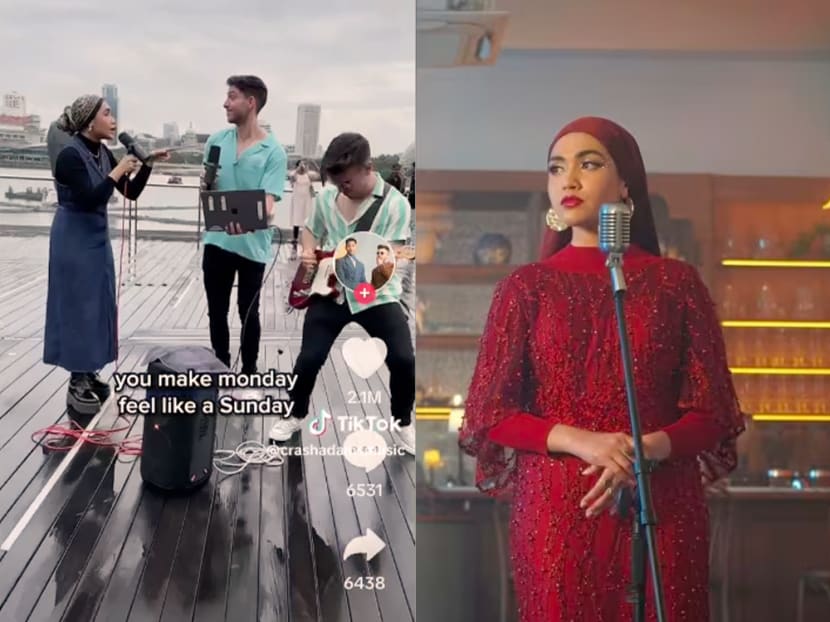Meet Shazza, the Singaporean singer who went viral after a Crash Adams TikTok
Shazza, whose real name is Shareefa Aminah, is a local singer-songwriter who recently went viral on TikTok for collaborating with Canadian pop duo Crash Adams. She tells CNA Lifestyle about her experience with the band, how she began her music journey and her struggles as a musician in Singapore.

(Photos: TikTok/crashadamsmusic, Marcus Dylan Yeo)

This audio is generated by an AI tool.
Waking up to a flood of notifications, Singaporean singer-songwriter Shazza, thought she was getting cancelled.
It was 1.30pm when the 23-year-old, whose real name is Shareefa Aminah, saw her phone blowing up with messages from her friends and social media pages.
“I got a bit worried for a moment because sometimes, social media is not the nicest space and I wasn’t sure what to expect but I was very happy to see that it was all positive stuff about the video,” said the singer.
The video in question, posted by Canadian pop duo Crash Adams, featured Shazza singing a freestyle verse for their latest single Good Side. Since its release on Feb 6, it has garnered over 17 million views on TikTok and another 6.8 million on YouTube at the time of writing.
Thanks to the viral video, Shazza's Instagram followers shot up from about 2,000 to over 90,000 in just one week.
As for how the collaboration came about, she said: “It was a right place, right time kind of thing that really worked out in my favour.”
Crash Adams came to Singapore to perform at Mediacorp’s Let’s Celebrate 2024 at The Promontory at Marina Bay on Dec 31 last year. While Shazza sang at the same event, she didn’t get to talk to them as it was too hectic backstage.

Following that performance, the duo started making content in Singapore and reached out to Shazza.
Having seen some of their previous videos, she thought it would be a fun opportunity. So, she took it and sang Good Side live at Marina Bay Sands.
HOW HER ARTISTE JOURNEY BEGAN
Shazza, who is Indian-Muslim, grew up around music. Her mother favoured tunes by Norah Jones, while her father had Bollywood tracks on repeat. Thanks to her younger brother, she was also exposed to the energetic beats of the Black Eyed Peas.
“I've always loved music,” she shared. “I can't remember when I started singing, but it's something that I've always enjoyed doing.”
What she does remember is that she started writing songs when she was 11.
Shazza said she had always been drawn to lyrics and used to go through the lyric booklets that came with CDs. And so, it was only natural for her to try and create some of her own.
Initially, she only played her songs for her friends and family but decided to pursue music more seriously after entering polytechnic.
Taking inspiration from YouTubers-turned-musicians Conan Gray and Troye Sivan, she began posting her songs and covers on YouTube.
“No matter how few views there were, seeing people connect with my music was something that meant a lot to me because that's why I've always wanted to do what I do,” she said.
“I think that is the essence of music. You could write a song but what gives it meaning is how people interpret it and how they connect to your music, you know? So it was very special to me and that only fuelled my want to continue to make it a real thing.”
PUTTING HERSELF ON THE MAP
From filming with a shoddy laptop camera to professionally producing songs, Shazza released her single Pity Party in 2022. Besides putting it up on Spotify, she also released a music video.
That wasn’t all she did.
The singer, who graduated from Ngee Ann Polytechnic with a diploma in Mass Communication, believes that promoting herself and her music is vital to becoming a musician in Singapore.
“As a society, given how young we are and our beginnings until now, we've always been looking very outward. We look out in the world and try to – not imitate – but aspire towards that, which is what has gotten us to where we are today,” she said.
But this has also made it harder for homegrown musicians to gain traction as Singaporeans often pay more attention to international artistes, she added.
Using her Mass Communication background, Shazza then developed a marketing strategy.
She sent out press releases to local media such as radio stations and news outlets, as well as PR packages to friends and influencers who could help promote her song.
Besides that, she applied for a National Arts Council (NAC) grant to help fund some of her endeavours, and played gigs whenever she could.

The singer also received support from her label Cross Ratio Entertainment, producers Dominic Yuan and Genesis Keefer, and one of the biggest music streaming services, Spotify.
She explained that whenever Spotify liked a song she released, they’d put her face on the playlist cover. It started with Fresh Finds SG & MY and Women On Singapore before she became an ambassador of Spotify’s Equal campaign – a global programme that drives equity for women in music.
This landed her on a billboard at the iconic Times Square in New York City in August last year.
Over 24 hours, a photo of her in a black hijab and colourful top would periodically flash on the big screen.
“That was crazy. This was a few days after my birthday so it was the best birthday present. It was mad to think about because I have been to New York once and I walked down that same street. Then (10 years later,) my face was there,” she said.
Reflecting on her efforts, she said: “I never expected to, for example, put out a PR kit and have the whole of Singapore know who I was.”
“But for the most part, I usually keep an open mind. So when I'm doing something, I'm like, 'This could go either way…' So when it works, it works. When it doesn't, it doesn't. I don't really try to spend too much time hyper-fixating on that.”
STRUGGLES AS A MUSICIAN IN SINGAPORE
As Shazza mentioned, it is difficult for homegrown artistes to break into the music industry.
“If you talk to any musician, they're going to tell you that it's a struggle,” she said, adding that there seems to be a stigma against local music.
She explained that she occasionally receives "backhanded" compliments regarding her music. Once, she had someone express surprise upon learning that the song they heard on the radio was not by an international artiste but rather, by her – a local one.
“I'm really glad they enjoyed it, but at the same time, it's like, why does it have to be international for it to be good, you know what I mean?”
The singer also found herself getting backlash over her identity as a hijabi who makes music. While she had expected this going into her career, she also shared that it sometimes feels like an attack on her faith.
Still, she doesn’t think that all the comments are mean-spirited. “The majority of the comments are more like, ‘Oh, are you Muslim? I thought making music is haram,’ and I think a lot of the things they base that notion on are up for interpretation. That is my personal belief, and I interpret it differently,” she said.
She added that she believes that music has the power to impact people’s lives and that all she’s doing is singing about life and love.

Nevertheless, the singer shared that for every negative comment she receives, there are a hundred kinder ones, with her favourite being uplifting messages from those in her community.
“I know that everybody is operating on their own belief system… and there's nothing wrong with that. You can believe something, and I can believe something.”
But that is not to say that the singer never had second thoughts about her music career. Negative comments aside, Shazza said there were times she felt drained as her streams didn’t reflect the amount of effort she put in.
“I need to put food on the table eventually. Like what if this doesn't work out, and I'm putting so much time into this when I could be working on my degree fully?”
The singer, who calls herself an “on-and-off student”, is an undergraduate at Wee Kim Wee School of Communication and Information.
She started her pursuing her Communication Studies degree in 2021 but soon realised that despite finding the coursework valuable and relevant, she couldn’t envision marketing as her full-time job.
On top of that, she was finding it harder to balance her school commitments with her music career and so, she took two semesters off.
At first, her parents were apprehensive. But as they had always been supportive of her music career, they gradually became receptive to the idea.
Shazza affirms that she intends to finish her degree, saying: “I want to honour the importance and value my parents hold for my education.”
MOVING FORWARD
Although the singer received an influx of followers from the Crash Adams feature, her newfound popularity has yet to transfer onto her music.
Determined to bring more attention to her art, she devised a plan – to release new music.
With a new song coming out soon, Shazza hopes it will encourage listeners to tune in to her previous releases.
When asked about her other goals, the homegrown singer said her “ultimate dream” is to write the National Day song.
“I think I tend to get ahead of myself, so I already started writing it… They haven't even given me the gig but you know, I think it’s better to be prepared.”
“I really want to be able to do what I love for the country because I really love Singapore,” she said.
That aside, the singer strives to put Singapore’s music scene on the global map while representing her community at the same time.
She said: “Sometimes as an Indian-Muslim, I don't really know where I stand but I like that, because it allows me to connect with two different groups in my own way, and it's special to me.”

Shazza elaborated, saying that growing up, she only had Yuna – a Malaysian hijabi artiste, who has collaborated with stars like Usher – to look up to.
“My aim is not to be famous, but to be known enough that I can help other people feel seen… When I saw Yuna in secondary school, I was like, maybe I can do that too. It's just one person, but maybe I can be the second one, or the next few.
“I just want to be able to give people that sense of importance because it makes a difference when you look and recognise somebody from your community doing something that you aspire towards.”







